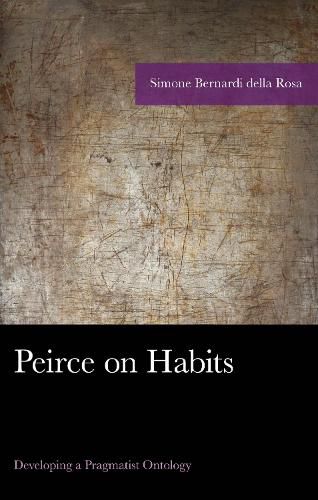Readings Newsletter
Become a Readings Member to make your shopping experience even easier.
Sign in or sign up for free!
You’re not far away from qualifying for FREE standard shipping within Australia
You’ve qualified for FREE standard shipping within Australia
The cart is loading…






Peirce on Habits: Developing a Pragmatist Ontology investigates habit at its most fundamental level: as a mode of being. Through the lens developed by Charles Sanders Peirce, the American philosopher renowned for his contributions to semiotics and pragmatism, Simone Bernardi della Rosa explores how habits profoundly impact human cognition and self-conception, shaping our thoughts and behaviors. The author first analyzes the philosophical architecture of habit and its fundamental metaphysical properties, defending the thesis that habits are a mediating category between possibility and actuality characterized by generality. In the second part, Bernardi della Rosa argues that if humans are "creatures of habit," it is because they share the same ontological and temporal characteristics as habits. By delving into pragmatist theory and contemporary accounts of habits, Peirce on Habits illustrates how habits form a pivotal element of our reality, profoundly influencing future events as well as our reasoning and selfhood. This comprehensive study offers fresh insights into the role of habit in Peirce's philosophy and pragmatism's relevance to ongoing philosophical discussions about habit.
$9.00 standard shipping within Australia
FREE standard shipping within Australia for orders over $100.00
Express & International shipping calculated at checkout
Peirce on Habits: Developing a Pragmatist Ontology investigates habit at its most fundamental level: as a mode of being. Through the lens developed by Charles Sanders Peirce, the American philosopher renowned for his contributions to semiotics and pragmatism, Simone Bernardi della Rosa explores how habits profoundly impact human cognition and self-conception, shaping our thoughts and behaviors. The author first analyzes the philosophical architecture of habit and its fundamental metaphysical properties, defending the thesis that habits are a mediating category between possibility and actuality characterized by generality. In the second part, Bernardi della Rosa argues that if humans are "creatures of habit," it is because they share the same ontological and temporal characteristics as habits. By delving into pragmatist theory and contemporary accounts of habits, Peirce on Habits illustrates how habits form a pivotal element of our reality, profoundly influencing future events as well as our reasoning and selfhood. This comprehensive study offers fresh insights into the role of habit in Peirce's philosophy and pragmatism's relevance to ongoing philosophical discussions about habit.